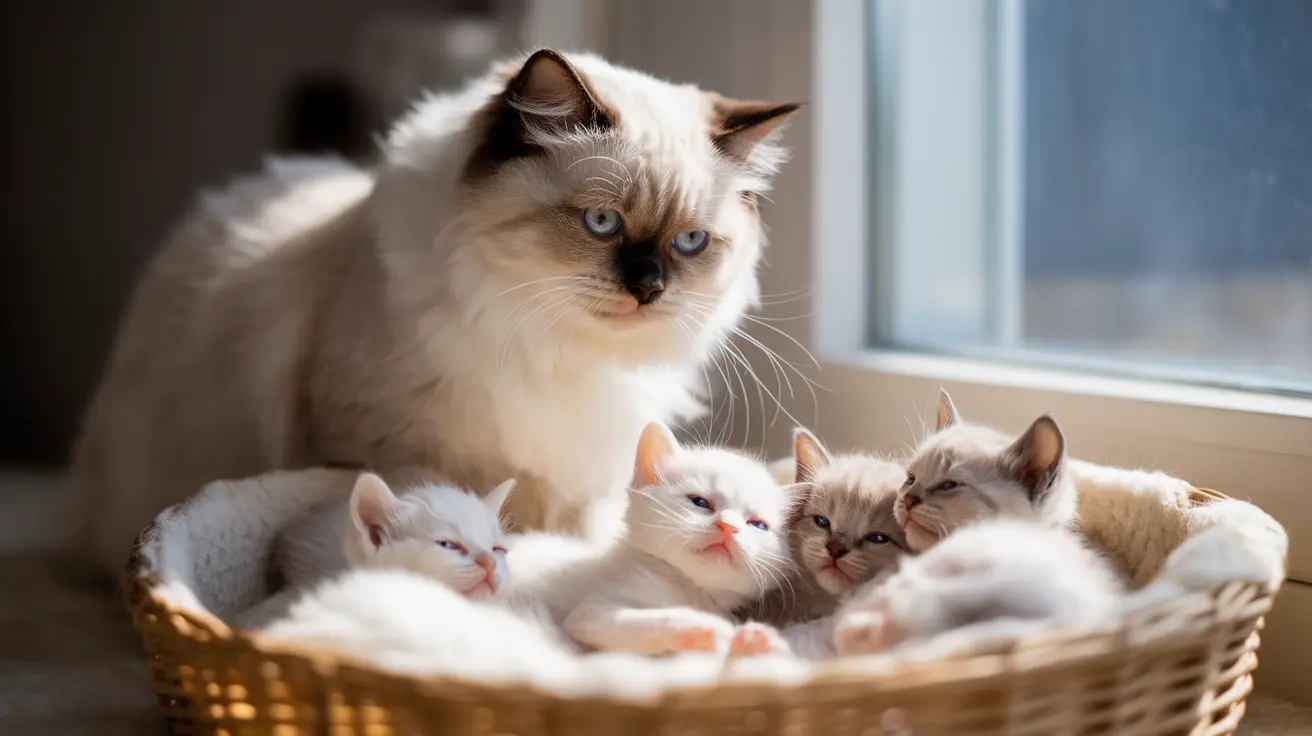If you've noticed your cat leaving her newborn kittens, you might be wondering whether this behavior is normal or cause for concern. The good news is that in most cases, a mother cat's temporary absences are completely natural and even necessary for both her wellbeing and her kittens' development.
Understanding the difference between normal maternal behavior and genuine abandonment can help you determine when intervention is needed and ensure the best possible care for both mother and kittens.
Normal Maternal Behavior: What to Expect
Mother cats naturally leave their kittens for short periods throughout the day. These brief absences serve several essential purposes:
- Eating and drinking
- Using the litter box
- Self-grooming
- Mental breaks from constant nursing
- Hunting (in outdoor cats)
These departures typically last 15-30 minutes and increase in frequency as kittens grow older and more independent. This behavior is particularly common after feeding sessions when kittens are contentedly sleeping.
Signs of Healthy Mother-Kitten Relationships
When a mother cat is properly caring for her kittens, you'll notice several positive indicators:
- Kittens are warm and well-fed
- The mother returns promptly when kittens cry
- Kittens are gaining weight consistently
- The nest area is clean and well-maintained
- Mother cat shows protective behavior around her kittens
When to Be Concerned About Mother Cat's Absence
While short absences are normal, certain situations warrant immediate attention:
Red Flags for Kitten Abandonment
- Mother cat absent for several hours
- Kittens crying constantly
- Cold or lethargic kittens
- No weight gain or weight loss
- Mother showing aggressive or avoidant behavior
- Visible signs of illness in mother or kittens
Understanding Why Mother Cats Abandon Kittens
Several factors can lead to genuine kitten abandonment:
Health Issues
- Mastitis (painful breast infection)
- Post-birth complications
- General illness or injury
Environmental Factors
- Excessive noise or disturbance
- Too much human handling
- Presence of other animals
- Unsafe or unstressed nesting area
Maternal Inexperience
- Very young mother cats
- First-time mothers
- Premature birth situations
How to Support a Nursing Mother Cat
To encourage healthy maternal behavior:
- Provide a quiet, secure nesting area
- Keep food and water easily accessible
- Minimize handling of newborn kittens
- Maintain consistent room temperature
- Monitor but don't hover
When and How to Intervene
If you suspect genuine abandonment, take these steps:
- Confirm extended absence (2+ hours)
- Check kittens' temperature and condition
- Contact a veterinarian immediately
- Prepare for emergency feeding if necessary
- Keep kittens warm and protected
Frequently Asked Questions
Why is my mother cat leaving her newborn kittens for short periods?
This is normal behavior. Mother cats need to eat, drink, use the litter box, and take short breaks. These absences typically last 15-30 minutes and are essential for the mother's health.
When should I worry if my cat is leaving her kittens for a long time?
Become concerned if the mother is absent for more than 2-3 hours, if kittens are crying continuously, appear cold or lethargic, or aren't gaining weight properly.
What health or environmental issues can cause a mother cat to abandon her kittens?
Common causes include mastitis, post-birth complications, stress from noise or disturbance, unsafe environments, or the mother's inexperience or young age.
How can I tell if my newborn kittens are being properly cared for by their mother?
Well-cared-for kittens are warm, quiet when sleeping, gain weight steadily, and have clean fur. The mother will return regularly to feed them and show protective behavior.
What should I do if I suspect a mother cat has truly abandoned her kittens?
Contact a veterinarian immediately, keep the kittens warm, and prepare for possible bottle feeding. Don't wait too long to intervene, as newborn kittens need frequent feeding and care to survive.
Understanding your mother cat's behavior and knowing when to seek help ensures the best possible outcome for both mother and kittens. While temporary absences are normal, being alert to signs of genuine abandonment can make the difference in saving young kittens' lives.






